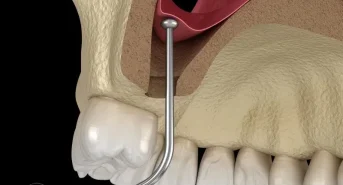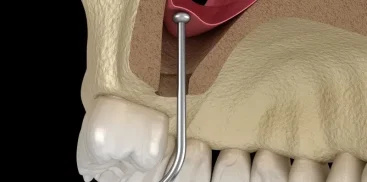What is endodontics?
Endodontics, commonly known as root canal treatment, is a branch of dentistry that focuses on the therapy of dental pulp and periapical tissues disorders. It is a significant component of conservative treatment. The surrounding aura of endodontics has given rise to many myths still circulating in society, and some patients react with fear at the news of the need for root canal treatment. In this article, we aim to present the treatment process accurately, dispel certain doubts, and finally introduce a specialist in the field of endodontic treatment working in our center.
When is it worth starting endodontic treatment?
The decision to undergo root canal treatment is made by the doctor after analyzing the patient’s medical history, conducting an examination, and carefully assessing X-ray images. Endodontic treatment becomes necessary when there is inflammation of the dental pulp, and this process is irreversible and cannot be halted using traditional treatment methods, meaning that tooth filling is not sufficient. In the case of pulp inflammation, a decision must be made regarding further action.
Sometimes patients hesitate about the sense of root canal treatment, fearing that the tooth will become dead after the procedure. However, it is important to note that each tooth has its value, and caring for it through proper oral hygiene is crucial. Even in seemingly complicated situations, it is worth taking all possible actions to preserve natural dentition.
How does the root canal treatment procedure proceed?
After evaluating the results of X-ray examination, the doctor proceeds to the procedure, starting with numbing the area and placing a rubber dam in the patient’s oral cavity – a special isolating rubber for the tooth. The rubber dam maintains a sterile and dry environment at the treatment site, simultaneously protecting the oral cavity from accidental entry of tool particles into the esophagus or trachea. The next step is to remove decay and prepare access to the root canals and crown of the tooth.
Then, the doctor proceeds to remove the pulp, thoroughly cleaning and widening the root canals. During this stage, the dentist disinfects the canals with a special solution of sodium hypochlorite, providing additional protection against bacteria. The meticulously prepared and disinfected canals are then dried and filled with a special substance – biocompatible gutta-percha. This naturally derived substance aims to effectively seal the canals, preventing reinfection.
In the final stage of the procedure, the dentist places a filling and proceeds to restore any deficiencies in the tooth crown, restoring its full functionality. The entire process aims not only to eliminate infection but also to preserve the natural structure of the tooth and ensure comfort and aesthetics for the patient.
Is root canal treatment painful?
This question often concerns patients considering endodontic treatment. In the past, this procedure did not enjoy a positive reputation due to potential pain, especially when performed in the presence of acute inflammation. However, thanks to advances in dentistry, we can now offer patients virtually painless procedures. Taking prompt action additionally prevents the development of pulp inflammation.
What endodontic services do we provide?
The Warsaw Dental Center offers comprehensive endodontic care, including diagnostics, root canal treatment, prosthetic restoration, and re-treatment when necessary.
Who are endodontists?
Endodontists are highly qualified specialists dealing with complex cases related to root canal treatment, diagnostics, and prosthetic restoration of teeth.
When is it too late for root canal treatment?
Delayed recognition of changes requiring canal treatment is one of many contraindications for this type of treatment. There are situations beyond one’s control that make effective root canal treatment impossible. Therefore, precise diagnosis based on the results of conducted examinations plays a crucial role.
A dentist will not be able to perform root canal treatment if:
- The pulp has calcified, resulting in the closure of the tooth canal lumen.
- The tooth has fractured subgingivally or vertically.
- There is extensive bone loss around the tooth.
- The wisdom teeth erupt abnormally, manifesting as unusual root canal anatomy.
- The tooth is severely damaged, and decay has also affected its roots.
- Root bifurcation has occurred (furcation).
In each of these cases, early diagnosis of the problem and taking appropriate action are essential to avoid the need for root canal treatment at an advanced stage. Regular dental check-ups and meticulous oral hygiene can contribute to early detection of potential threats and maintaining healthy teeth.
How to avoid the need for root canal treatment?
The most effective preventive measure against the need for root canal treatment is to maintain proper oral hygiene. Since root damage can result from cavities, trauma, or other conditions, making efforts to prevent such damage will help preserve tooth health and minimize the need for root canal treatment.










